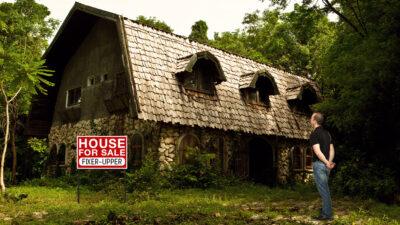Buying real estate is one of the single most expensive and time-consuming purchases people make in their lives. In an effort to save money, it’s tempting to go with a fixer-upper. After all, why not save the money and instead use your handyman skills to finish your dream homestead property? Thinking about saving thousands seems like a good idea at first.
Unfortunately, fixer-upper properties often cost far more in the long run than what would have been saved buying a finished home. Let’s take a look at the advantages and disadvantages of buying an unfinished property.
Advantages:
1. You Can Customize the Property as You See Fit. This is one of the most appealing aspects of buying a fixer-upper. Generally, people will gladly pay extra for a customized home that reflects what they consider ideal. A fixer-upper allows you to save money by finishing the property according to your specifications, not someone else’s.
2. You Can (Potentially) Save Money. The second most popular, and for some the biggest factor in a fixer-upper, is being able to save money. There is a huge price difference between a fixer-upper and a finished home or property. After all, you just know you can fix all those problems.
3. Your Equity Will Increase Much More Quickly. Equity has many benefits. Finishing a fixer-upper within a short timeframe after purchasing it will allow you to refinance sooner. Overall, the total value of your property will greatly increase with a fixer-upper compared to buying and renovating a finished home.
4. You May Be Eligible for Renovation Loans. This can be an option if you’re borrowing money from a lender to purchase your property. Depending on whether your fixer-upper needs aesthetic fixes or has totally structural damage, you might be eligible for a 203k mortgage.
Disadvantages:
1. It Can Cost Much More in the Long Run. The major downside of a fixer-upper is how expensive finishing a house, let alone a rural property, can be. Often, home owners find out the hard way that all the money they saved on their property is eventually spent on fixing it. Aside from obvious things that need to be fixed on a property, consider invisible repairs that a house might need — such as electrical. These issues are expensive, and aren’t always obvious. This is one reason why hiring an inspector is so important.
2. It Takes A Lot More Time Than You Can Imagine. Renovating a property is literally like a full-time job. If you plan on doing most of the work yourself, you’ll not only be spending a lot of time actually building but also buying supplies, learning the necessary skills to finish the property — and deal with your daily life. If you already have a full-time job, a fixer-upper could potentially be a bad decision. You could always work with a contractor or crew to save time, but this will cost more money.
3. You May Be Stuck with a House You No Longer Want. Sometimes life happens and a family emergency occurs, you lose your job or have to relocate. An unfinished fixer-upper will be very difficult to sell. Even if you do end up selling it, you’re highly unlikely to even make your money back. If you’re considering buying a property that needs considerable renovating, plan on living in that house for at least 3-5 years before thinking of selling it.
Despite the common and very financially serious disadvantages of buying a fixer-upper, there are situations in which a fixer-upper can really be a good idea. If you ask anyone who finished their fixer-upper property if it was worth it you’ll usually get a yes, even if it cost more than they planned. There is a lot of pride for a house and property in which you’ve invested your blood, sweat and tears.
What to Look For In a Fixer-Upper Property
If you have the time and money to invest in an unfinished property and want to move forward, consider several elements. First off: location. Generally, if you’re looking to move out to a rural area to start a self-sufficient lifestyle, you’re probably wanting to find a property you’ll spend the rest of your life on — or at least 10 or more years. Either way, a safe, attractive location is important if/when it comes time to sell.
You’ll want to closely examine the house itself to see if the layout is what you need. Even though you can definitely add on additions, they can be expensive. Strive to find a property that has a house with enough bedrooms and bathrooms as well as enough space in general.
Finally, if you have a potential fixer-upper that seems promising, it’s time to hire an inspector. There is never a good reason to skimp on an inspection. Ideally, the seller will pay for a roof certification, pest inspections, general home inspections and a home warranty.
All in all, a fixer-upper can be worth it if you have the money, time and skill to finish it. Have you ever bought a fixer-upper? Please share your stories (the good and the bad) in the comment section below:
Sign up for Off The Grid News’ weekly email and stay informed about the issues important to you
 Off The Grid News Better Ideas For Off The Grid Living
Off The Grid News Better Ideas For Off The Grid Living





